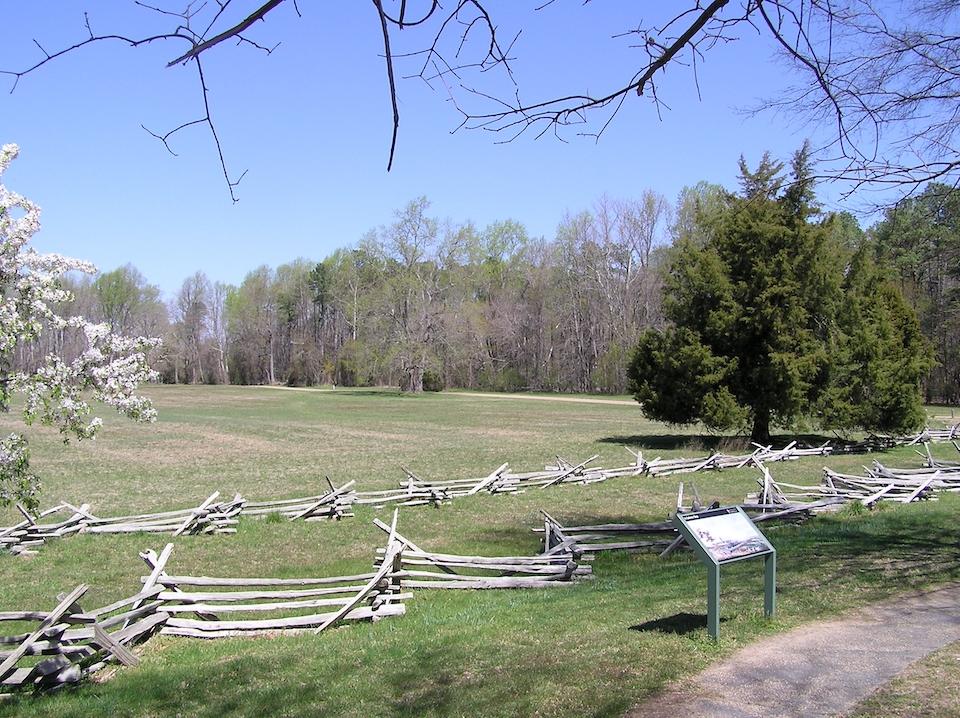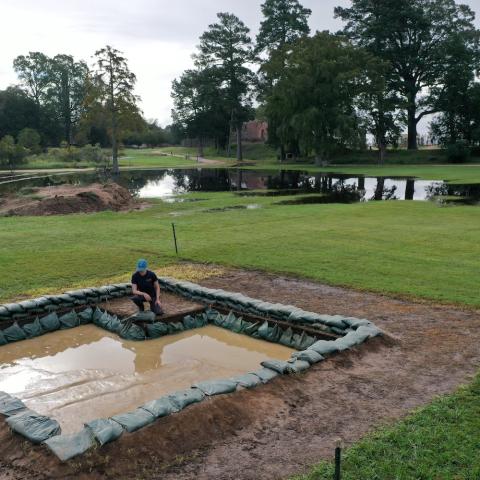
A filmmaker shooting in Colonial National Historical Park was practicing his First Amendment rights and didn't need a permit, a judge has ruled.
Editor's note: This updates with National Park Service reaction.
A federal judge has struck down as unconstitutional the National Park Service's practice of charging commercial filmmakers who want to shoot in the National Park System, ruling it is a protected activity under the First Amendment.
The ruling (attached below) by U.S. District Judge Colleen Killar-Kotelly stated that the permitting practice, through which the Park Service charged commercial filmmakers for a permit and any costs relating to park personnel assigned to monitor the filming or other cost recovery, "is an unconstitutional restriction on speech protected by the First Amendment."
"The statute imposes a chilling effect on the expressive activities of a wide swath of national park visitors," wrote the judge in her ruling Friday. "Consequently, there is a significant equitable interest in avoiding the unconstitutional application and enforcement of (the requirement) and its implementing regulations."
Congress in 2000 directed the secretaries of Interior and Agriculture "to require a permit and establish a reasonable fee for commercial filming activities or similar projects, as well as certain still photography activities, on federal lands under their respective jurisdictions. The law also directed the Secretaries to recover costs incurred by the agencies as a result of the permitted activity. Fees collected under this authority are to provide a fair return to the United States; be based, at a minimum, on certain listed criteria; and be retained by the Agencies to be available to the Secretary without further appropriation to be used consistent with the formula and purposes established for the Recreational Fee Demonstration Program."
The case was brought by Gordon M. Price, a Yorktown, Virginia, filmmaker who filmed settings in Colonial National Historical Park in Virginia for an independent feature called Crawford Road. The film revolved around "a stretch of road in York County, Virginia, that has long been the subject of rumors of hauntings and was the location of unsolved murders.”
Price, who didn't obtain a permit for filming in the park, debuted the production in October 2018 before an audience of about 250.
"The film garnered some attention in the local press and on social media sites," the judge noted in her ruling. "In December 2018, however, two NPS officers located Mr. Price at work and 'issued him a violation notice for failure to obtain a commercial filming permit.'"
In challenging the permitting requirement, Price pointed out that it does not apply to non-commercial filming, nor does it apply to news organizations. The absurdity of differentiating on the basis of whether a production was commercial didn't escape Judge Killar-Kotelly.
"For example, a 'non-commercial' filming production carried out by a non-profit organization or a news crew would escape the reach of (the) permitting regime, even if those groups used heavy filming equipment that damaged federal land," she wrote.
The permitting language carried no differentiation between large film crews with heavy equipment and small crews with no heavy equipment; Price used a single tripod with a camera and no more than four people.
"Defendants offer no explanation for how the broad sweep of this permitting regime is sufficiently tailored to the government’s goal of protecting federal land," noted the judge.
Judge Killar-Kotelly, in agreeing with Price, pointed out that the U.S. Supreme Court long has recognized film as being protected under the First Amendment, and that the high court "has found that 'the creation and dissemination of information are speech within the meaning of the First Amendment.'"
Taken in total, Price's "filmmaking at these parks constitutes a form of expressive speech protected by the First Amendment," she ruled.
In Washington, National Park Service officials were reviewing the judge's ruling "and determing the next steps," said Jenny Anzelmo-Sarles, the agency's chief of public affairs and chief spokesperson.
“This case started when the Park Service tried to criminally cite Gordon Price for unobtrusively making a film in a public park,” Price's attorney, Robert Corn-Revere, told the National Press Photographers Association. “But Gordon fought for his rights and prevailed. The court’s decision reaffirms that the act of filmmaking is protected by the First Amendment, and that the government cannot condition this right with arbitrary permit and fee requirements.”
The ruling did not apply to commercial still photography, however, as Price did not challenge that aspect of the Park Service permitting requirements.
In citing the permitting language applying to the Park Service's ability to recoup costs for damages inflicted during filming, the judge pointed out that "(W)hile the government and the public do have an interest in preserving federal lands, such an interest does not justify a widely over-inclusive law that infringes upon free expression. ...
"Moreover, the National Park Service has also shown itself capable of enacting regulations that preserve park resources without overly burdening expressive activity, and may continue to do so in ways that do not run afoul of the First Amendment," she held.


 Support Essential Coverage of Essential Places
Support Essential Coverage of Essential Places







Comments
I think you're right on the mark, Tom. The proper approach would be to strike, rethink, revise, rework, and correct the overly broad, inadequately focused, arbitrary and capricious regulations in this subject area as a whole. Do away with the absurdity of differentiating on the basis of whether a production is or is not a commercial enterprise, as well as the absurdity of differentiating between motion filming and still photography. Do a complete systemic review of all the regulations, permits, and fees related to these kinds of operations; do away with any and all arbitrary and capricious elements; and focus on what is needed to protect park resources, reimburse the parks for added workload, and provide a system that monitors, assesses, and recovers the costs of any damages. Eliminate discrimination, bigotry, and implement equitable good governance. Ask the park superintendents for their input. Let's get to work. Given our national problems and the need to protect our parks, we don't have time for any additional extraneous philosophical or political grandstanding.
YouTube travel volggers Kara and Nate describe their $1000 fine from the NPS beginning at 7:00 in this video. I understand the need for some supervision of disruptive heavy duty film productions, but "no-hassle" accomodations were definitely needed for the person filming commercially with only a phone or GoPro and maybe a tripod while hiking or describing in a National Park. https://www.youtube.com/watch?v=RHvHn9hs1MY&t=543s
Totally unrelated, but that's been done before even in filmed commercials. There was a Jeep commercial that was filmed for the US market. It was someone driving through a forested road as various woodland creatures enter his vehicle through an open moonroof and start singing along with the song playing on the stereo. I found a version that was shown in South Africa but just mirror imaged since they drive on the left and use right-hand drive cars. The actor had a watch and a wedding ring on his left hand by on the right in the South African version. The did fix the JEEP logo and the display on the center console display.
Yeah they do need that protection, you are right, but the Judge didn't overreach. Overreach would have entailed actually making those regulations. The judge just basically said, the guy with a tripod recording videos needs to be left alone. If you want to regulate larger film crews then do it. Don't mess with the little guy expressing himself. Maybe if the NPS did this in the first place then this wouldn't have happened.
After a two and a half year lawsuit against the United States Government we finally won. You can now film on National Park Land without a permit. But the ruling came with a cost. Our movie was held back from release and the bills piled up. I would like to ask for a favour, watch my movie to help us catch up on bills and get this ground breaking movie out to the public (its a very good movie not for faint of heart), now that it has been cleared for release. The ruling in our favor can be seen here National Park Service Can't Require Permits and Fees for Commercial Filming, Judge Rules | Hollywood Reporter
link to Crawford Road movie
Crawford Road | gordon price (pivotshare.com)
But the problem with this NPS regulation is that it is all-encompassing. It lumps me in with a "film Crew." I am a person with a youtube channel and a cell phone which in no way will damage the national park in anyway when I record myself at the park. I agree all the national parks need to be protected but the regulation needs to be rewritten. It is outdated and does not take into consideration commercial filming is something as simple as a gopro or cell phone. And yes, I do know YouTubers who have been funded thousands of dollars for filming in a NP with a cell phone and posting it on YT.
Just a side note, I live just outside Great Smoky Mountains National Park in TN. While there are fees for campsite/backcountry hiking shelters there are no parking fees or admission fees to visit this National Park. Collecting a fee for commercial filming is helpful in it's unique situation.
This incident that triggered this ruling was totally avoidable. We have developed in this country and now in the NPS an aggressive Law Enforcement mentality and it is now being taught at FLETC and permeates our agency culture. This began many years ago, -- especially after 9/11. But slowly we have seen the NPS LE Ranger force become more and more militaristic, more "police like", and more aggressive and more separate from the rest of the agency. They also feel much more entitled to higher pay, overtime for incidents, etc. How they dress, talk, act and how they expect admiration is apparent and often goes on but no one challenges it. It starts at the top and has been encouraged and facilitated There is little room and space to question what has happened and if you do it is brushed aside as being "anti Ranger" and anti NPS and then we go back to endless hero worship.
Remember when all Rangers had the same badges? Remember when the word Ranger meant something all encompassing. Now we have "Protection Rangers" and they have really one primary job and they let their peers know it for sure. This specialization will continue and we will recruit "Protection Rangers" who often want to be cops. So, "Protection Rangers" will aggressively pursue a film permit violation which probably would have just gone unnoticed by and large - can't imagine these rangers didn't have other things to do on the Colonial Parkway? What superintendent would really want their "Protection Rangers" to show up and issue a citation for a film that was seen by 250 people. Maybe, just maybe, sending a letter or a simple conversation would have done the trick.
I believe this is less about First Amendment and more about the agency's inability to control a "kick in the door, take no prisoners" mentality that now permeates the ranks of our Protection Ranger force and NPS Protection Ranger leadership.